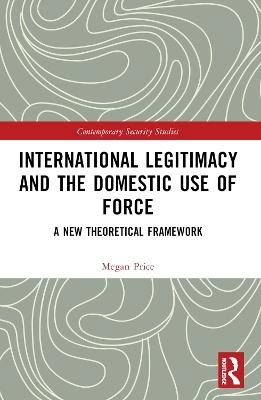
International Legitimacy and the Domestic Use of Force
A New Theoretical Framework
Seiten
2024
Routledge (Verlag)
978-0-367-76502-6 (ISBN)
Routledge (Verlag)
978-0-367-76502-6 (ISBN)
This book examines how states justify the domestic use of military force to foreign audiences.
By deploying a sociological approach to legitimacy and drawing on conceptual tools which deal directly with the dynamics of justification, it offers a novel framework for understanding the politics of international legitimacy and domestic armed action. The framework is grounded in detailed qualitative analyses of civil wars in Sri Lanka (2006–2009), and Aceh, Indonesia (2003–2005). The book shows that the meaning of legitimacy in a particular context does not flow directly from a menu of relevant rules, norms and ideas. Rather, legitimacy is always politically contested. When states justify fighting at home, the success of their claims is determined by their capacity to appeal to rules and norms but also to frame their action in ways that their audiences find compelling. Therefore, the framework offered in this book draws attention to the crucial but largely neglected role of audiences in the constitution of legitimacy.
This book will be of interest to students of security studies, law, human rights and international relations.
By deploying a sociological approach to legitimacy and drawing on conceptual tools which deal directly with the dynamics of justification, it offers a novel framework for understanding the politics of international legitimacy and domestic armed action. The framework is grounded in detailed qualitative analyses of civil wars in Sri Lanka (2006–2009), and Aceh, Indonesia (2003–2005). The book shows that the meaning of legitimacy in a particular context does not flow directly from a menu of relevant rules, norms and ideas. Rather, legitimacy is always politically contested. When states justify fighting at home, the success of their claims is determined by their capacity to appeal to rules and norms but also to frame their action in ways that their audiences find compelling. Therefore, the framework offered in this book draws attention to the crucial but largely neglected role of audiences in the constitution of legitimacy.
This book will be of interest to students of security studies, law, human rights and international relations.
Megan Price is a Sessional Lecturer in the School of Political Science and International Studies, at the University of Queensland, Australia.
Introduction, 1. Language: Approach and Key Concepts, 2. Legitimacy and the Domestic Use of Force: Charting a Theoretical Approach, 3. The Sri Lankan Conflict (2006–2009): Justifications, 4.The Aceh Conflict (2003–2005): Justifications, 5. The Sri Lankan Conflict (2006–2009): Audience Responses, 6. The Aceh Conflict (2003–2005): Audience Responses, 7. The Politics of International Legitimacy, Conclusion
| Erscheinungsdatum | 11.08.2022 |
|---|---|
| Reihe/Serie | Contemporary Security Studies |
| Zusatzinfo | 1 Tables, black and white |
| Verlagsort | London |
| Sprache | englisch |
| Maße | 156 x 234 mm |
| Gewicht | 453 g |
| Themenwelt | Sozialwissenschaften ► Politik / Verwaltung ► Europäische / Internationale Politik |
| Sozialwissenschaften ► Politik / Verwaltung ► Staat / Verwaltung | |
| ISBN-10 | 0-367-76502-0 / 0367765020 |
| ISBN-13 | 978-0-367-76502-6 / 9780367765026 |
| Zustand | Neuware |
| Informationen gemäß Produktsicherheitsverordnung (GPSR) | |
| Haben Sie eine Frage zum Produkt? |
Mehr entdecken
aus dem Bereich
aus dem Bereich
Studienbuch
Buch | Hardcover (2023)
De Gruyter Oldenbourg (Verlag)
CHF 62,90
Amerikas Strategie der Vorherrschaft und der Kampf um Eurasien
Buch | Softcover (2024)
NOMEN Verlag
CHF 27,95


